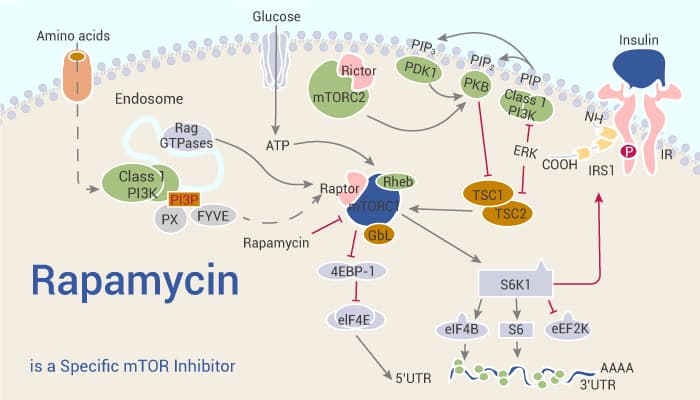mTOR (mammalian target of Rapamycin) is a protein that in humans is encoded by the mTOR gene. mTOR is a serine/threonine protein kinase that regulates cell growth, cell proliferation, cell motility, cell survival, protein synthesis, and transcription. In addition, mTOR links with other proteins and serves as a core component of two distinct protein complexes, mTORC1 and mTORC2, which regulate different cellular processes. The mTOR pathway is dysregulated in human diseases, such as diabetes, obesity, depression, and certain cancers.
Rapamycin (also known as Sirolimus or AY-22989), a macrolide antibiotic, is a specific inhibitor of mTOR which induces autophagy in a variety of cell types. Moreover, Rapamycin is also an immunosuppressive agent that binds simultaneously to the 12-kDa FK506- and rapamycin-binding protein (FKBP12, or FKBP) and the FKBP-rapamycin binding domain (FRB) of mTOR kinase. The FKBP12-Rapamycin complex binds directly to the FRB domain of mTOR, inhibiting its activity. Rapamycin can prevent immune exclusion after organ transplantation. According to reports, Rapamycin also can exert anti-tumor activity and cell growth inhibitory activity, such as G1 phase arrest, and exhibit anti-angiogenic properties. In addition, Rapamycin combined with other chemotherapeutic agents has a synergistic cytotoxic effect on a variety of cancer cell types. For example, the co-treatment of Rapamycin and Docetaxel favorably enhances the cytotoxic effect of Docetaxel in lung cancer cell lines.

In summary, Rapamycin is a specific inhibitor of mTOR, an autophagy activator, an immunosuppressant, with anti-inflammatory and anti-tumor activities.
References:
[1] Huiyan Niu, et al. J Exp Clin Cancer Res. 2011 Mar 10;30(1):28.
[2] Sarah R Edwards, et al. J Biol Chem. 2007 May 4;282(18):13395-401.